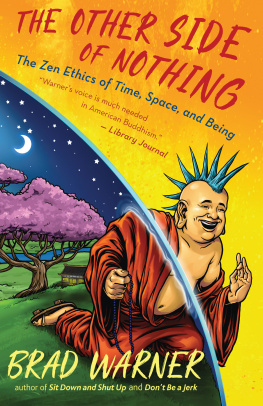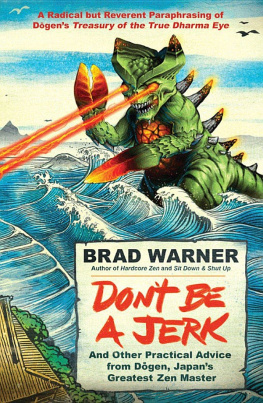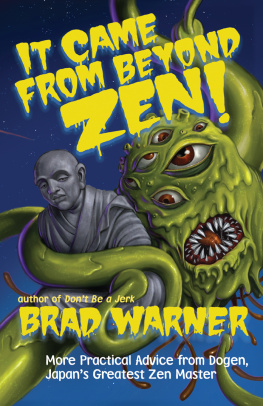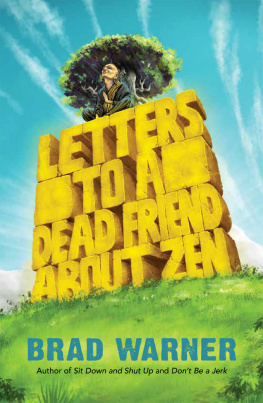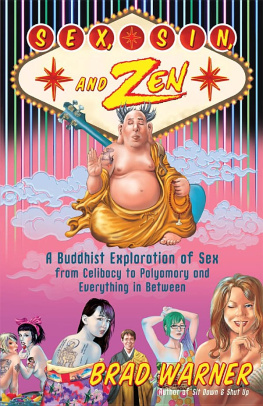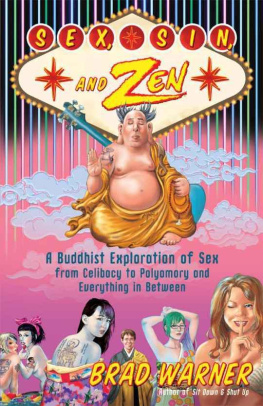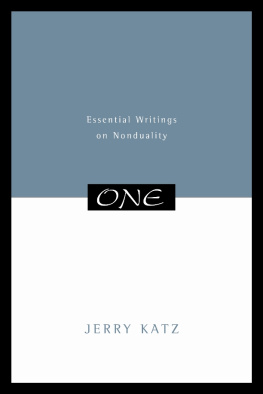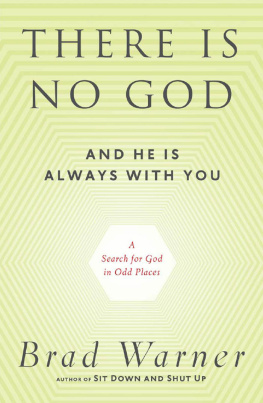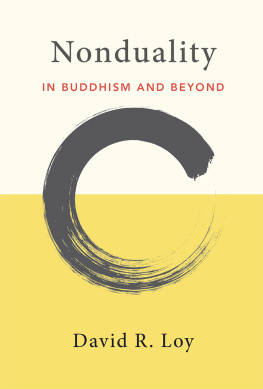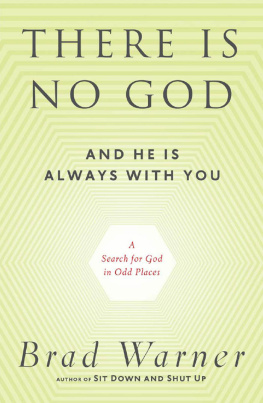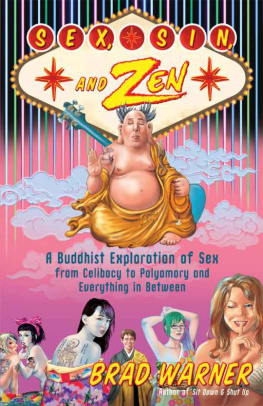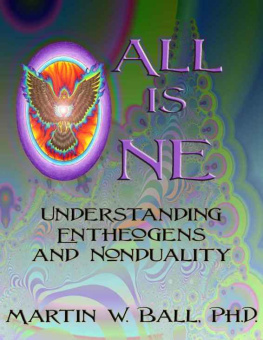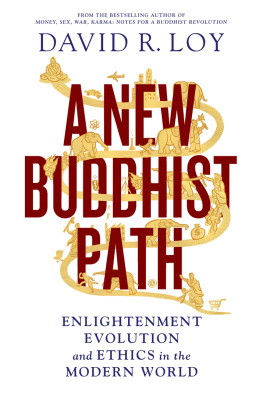Contents
Guide
Pages

ALSO BY BRAD WARNER
Dont Be a Jerk
Hardcore Zen
It Came from Beyond Zen
Letters to a Dead Friend about Zen
Sex, Sin, and Zen
Sit Down and Shut Up
There Is No God and He Is Always with You
Zen Wrapped in Karma Dipped in Chocolate


| New World Library
14 Pamaron Way
Novato, California 94949 |
Copyright 2022 by Brad Warner
All rights reserved. This book may not be reproduced in whole or in part, stored in a retrieval system, or transmitted in any form or by any means electronic, mechanical, or other without written permission from the publisher, except by a reviewer, who may quote brief passages in a review.
Text design by Tona Pearce Myers
Library of Congress Cataloging-in-Publication Data
Names: Warner, Brad, author.
Title: The other side of nothing : the Zen ethics of time, space, and being / Brad Warner.
Description: Novato : New World Library, 2022. | Summary: A longtime practitioner of Zen Buddhism discusses how the Zen concept of nonduality the essential unity of all things forms the basis of Buddhist ethics. The author describes key Buddhist doctrines such as the Four Noble Truths and the Eightfold Path, showing their relevance to modern problems -- Provided by publisher.
Identifiers: LCCN 2021062819 (print) | LCCN 2021062820 (ebook) | ISBN 9781608688043 (paperback) | ISBN 9781608688050 (epub)
Subjects: LCSH: Buddhist ethics. | Spiritual life--Zen Buddhism. | Zen Buddhism.
Classification: LCC BJ1289 .W37 2022 (print) | LCC BJ1289 (ebook) | DDC 294.3/5--dc23/eng/20220201
LC record available at https://lccn.loc.gov/2021062819
LC ebook record available at https://lccn.loc.gov/2021062820
First printing, May 2022
ISBN 978-1-60868-804-3
Ebook ISBN 978-1-60868-805-0
Printed in Canada on 100% postconsumer-waste recycled paper

| New World Library is proud to be a Gold Certified Environmentally Responsible Publisher. Publisher certification awarded by Green Press Initiative. |
10987654321
CONTENTS
Y OU ARE NOT reading this book.
I know some of you will read that statement and say, If youre going to start off like that, then Im really not going to read this book! Which is fine. Not every book is for everyone.
But Im serious. You are not reading this book. Right now. Youre not.
There is no you who could be reading this book. You is a fictional character. Language forces us to refer to this fictional character constantly, and so we have come to believe it really exists. In trying to describe how you do not exist, I am going to have to frame things in terms of you. In fact, I referred to another fictional character just now when I said I am going to have to frame things. I am not writing this book either. So there!
This philosophical outlook is what they call nondualism. There is no you. There is no me. There is just one undivided nondual something of which you and I are aspects.
Anyway, lets say you have a friend. Your friends birthday is coming up, and you want to buy her a nice present. So you focus on the mental picture you have of your friend. Using this mental picture, you can make some guesses about what she might want to receive for her birthday. But no matter how well you know your friend, you can never be completely certain what she wants. Even if she tells you what she wants, she might change her mind. Or she might get that thing and then later on realize she really didnt want it after all.
You also carry a mental image of yourself. If you pay attention to this image, youll discover that it is only slightly easier to predict what you might want for your own birthday than it is to predict what your friend might want for hers. Thats what I have discovered after doing nearly forty years of Zen Buddhist meditation practice, and I dont think Im all that different from anyone else.
Just like my friend might guess wrongly about what she wants for her birthday, I have often made the wrong guesses about what I want not only for my birthday but about what I want from life in general.
When I say that you and I do not exist, Im not saying that all the things we put into a conceptual box called me our feelings, our memories, our opinions, our bodies, and so on do not exist. What I am saying is that the conceptual box we put those things in is a fiction.
But most of us become slaves to that fiction. We spend a tremendous amount of time and effort defending our box against other boxes, or comparing our box to other boxes and feeling alternately proud or inadequate. Or worse, making our box fight with other boxes. We worry about what might happen to our box in the future. Or we suffer guilt about what our box did in the past. And we are terrified of the unavoidable day when our box will break down and crumble into pieces that can never be put back together again.
When I say that you and I do not exist, what I mean is that all our anxiety about our conceptual box is a big waste of time. Not only is it a big waste of time, but humanitys collective concern over our conceptual boxes is the root cause of all human misery. We are making ourselves and others suffer needlessly over nothing. And we have the ability to end that suffering right now.
This is a book about how to do that. Its about ethics and how ethics relates to nondualism. It is based on the teachings and traditions of a group of people collectively known as Zen Buddhists. Zen Buddhists, for the most part, do not like to call themselves Zen Buddhists, by the way. But some of us call ourselves that grudgingly because other people insist on calling us that.
Thats because Zen Buddhism is not a religion or a belief system. Its a set of practices that have been refined over the course of 2,500 years of research and development. None of these practices is considered to be so holy and sacred that it can never be improved on with further research and development. In fact, for any given Zen Buddhist practice there may be other practices from other traditions that are just as good and can be used in its place.
Having said that, though, I think there is value in studying a tradition that has such a long track record and has been put to such good use by so many people in such a wide variety of cultures, eras, and social settings. I think there are a lot of good reasons to trust the Zen Buddhist tradition, especially since its founder, the historical Buddha, encouraged us not to trust the practices he recommended until we had tried them out for ourselves.
In this book I intend to explain exactly why the Zen Buddhist tradition says that you and I do not exist, and why it says things will be so much better for all of us once we understand that thoroughly. I will also try to explain the various practices the Zen Buddhists have come up with for thoroughly developing the understanding that you and I dont exist. Ill also be talking about why the fact that you and I dont exist is a good reason to stop treating each other as badly as we humans tend to do.

